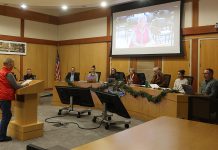The upcoming July 21 Windsor Town Council meeting will address four big items. Three of these pertain to the makeup of the town council itself, and one pertains to water resource management and the drought emergency.
How to fill the vacant council seat
In consideration of how to fill the vacancy left on the typically five-member town council following Sam Salmon taking the seat of mayor after former Mayor Dominic Foppoli’s May resignation, the town council is expected to pass a resolution to hold a special meeting on July 28 to resolve the issue. The four-member council has been divided on how to fill the vacancy. Whoever fills the vacancy would be on the council until the seat’s term expires in December 2022.
At Wednesday’s town council meeting, the council will have the option to take any of the following three actions:
- Adopt a resolution appointing a qualified individual to fill the seat left vacant following Salmon being appointed mayor
- Schedule a special meeting for July 28 to consider the options of appointment or calling a special election
- Direct staff to initiate the appointment process for applications/interviews or other steps
The next available special election isn’t until April 2022, which would leave the council with four out of five members, filling the seat for only nine months. Appointments are a standard, legal method of filling seats left vacant for any reason, however, following the public outcry against Foppoli’s alleged sexual misconduct, many community members are adamant that the next council member should be selected by the public, not the council.
Should the mayor be selected at-large or by the council?
Continuing the question of how public officials should be selected in the Town of Windsor, an item on the agenda will consider whether future Windsor mayors should continue to be selected by public election, or else appointed among council members.
In Windsor, council members are elected for four-year terms, with the mayor selected for two-year terms by each election cycle every other year.
In accordance with California law, the Town of Windsor can amend its municipal code to allow the council members to select the mayor themselves, every two years. This would require a special election on Nov. 2 of this year.
Heading back to the district drawing board
Following a 2018 lawsuit threat alleging that the town violated the California Voting Rights Act, the Town of Windsor transitioned to district elections, holding its first district-based council election in 2020.
District-based systems subdivide a jurisdiction into smaller areas corresponding to the number of council seats — in Windsor, there are four, with the mayor elected at large, pending the potential change to the municipal code noted above. During each election cycle, a certain number of districts are competitive, and voters in each area select their own respective council member. Proponents of district-based systems say this promotes equity because minority communities are often concentrated in specific geographical areas.
While the town spent multiple meetings in 2019 drawing the district lines for each of its four election areas, it’s required to once again look at its district maps to ensure that the boundaries are mapped using the latest Census results.
Data from the 2020 Census is estimated to be released by Sept. 30 and, as part of the redistricting process, the council must hold four public hearings, have public participation and engagement and post its draft maps. Additionally, the town has to establish a dedicated website for redistricting information including public hearing notes and video, draft maps, final boundary maps and other pertinent information.
The council will also be discussing whether or not it wants to pursue a demographic study to determine if the town can transition from district elections back to at-large elections while adhering to voting rights laws.
Dealing with the drought
Two items coming before the council will address water resource management. One is an acute measure in response to 2021’s historic drought; the other is a routine update to the water resource management plan that happens to correspond with the current drought. Both are public hearings.
As an immediate response to current drought conditions, the town council will consider declaring a Level 2 Water Shortage Emergency, which will include mandatory water restrictions.
Gov. Gavin Newson declared a drought emergency in Sonoma and other northwest counties April 21. Since then, local water resource management agencies have called for voluntary reductions to water usage, and the Windsor town council adopted a resolution May 5 declaring its support for voluntary reduction.
Windsor did not meet its 20% voluntary reduction goal in May, though its savings in June of this year were 12.5% higher compared to June 2020. A Level 2 emergency declaration, which would not only be in response to the drought, but to directives from higher governing agencies, would include restrictions to certain “non-essential” water uses.
Water restrictions that would be enforced by penalty under Level 2 restrictions would include: limiting landscape irrigation to certain days and times of day, and not by sprinkler systems (handheld or drip irrigation systems are subject to allowances, and leaky irrigation systems will have to be promptly repaired); allowing restaurants to serve water upon request only; and increasing water waste patrols. The town would also expand its drought-related public information campaign and providing rebates for residents who replace grass yards with turf.









